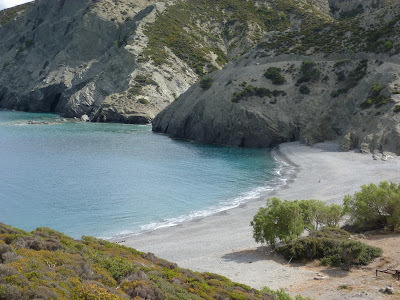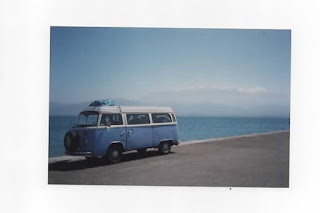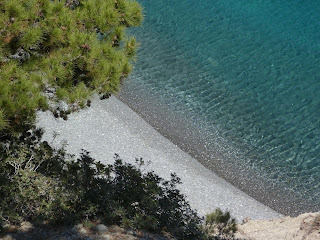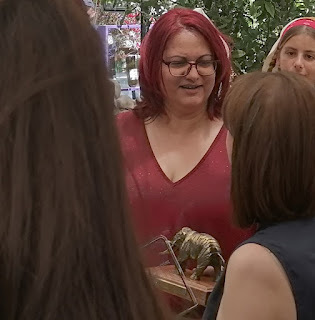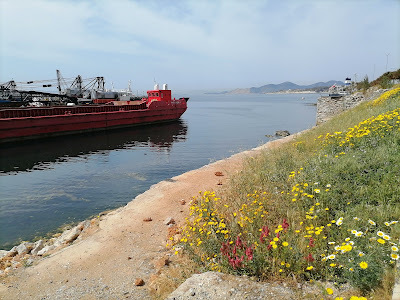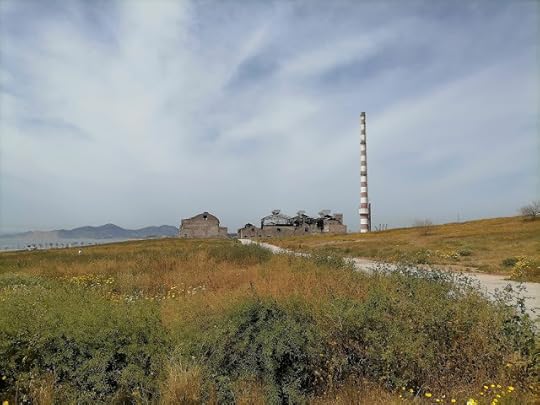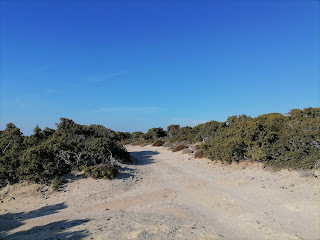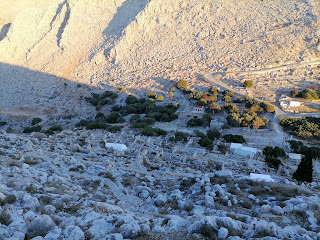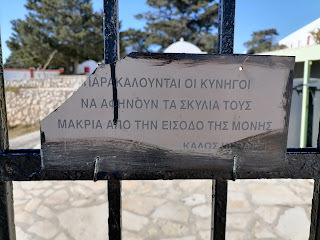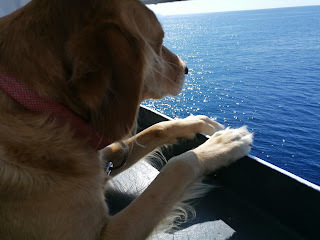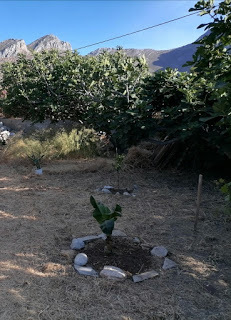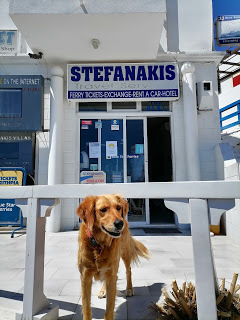Jennifer Barclay's Blog, page 2
September 13, 2022
Taverna

Here in Tilos, the baking summer heat and crowds have gone. Eristos beach is fringed by white sea daffodils. Sea squills have shot up in the last week too, their tall stems glinting in the afternoon light on the hillside, their bright white flowers making the deep blues and greens on the road to Plaka even more vivid. The taverna at Ayios Antonis harbour no longer has enough business to stay open in the evenings - we were lucky to have a last dinner there of goat and imam. Everything feels calmer, except for the sea today - the wind is blowing from the north and the waves are crashing in.
Life's been too busy this week so for now this is a very quick post to say, for those who don't know already, that my new book is out this month and gradually making its way to various points around the globe - what a thought! I'll write a proper blog soon for in the meantime here's a tiny extract from September in the book.
'For years, I'd thought about sleeping on the beach from time to time, and now I was doing it often. Whatever happened from now on, I'd done what I hoped for, spent a whole summer by the sea. I woke at dawn and watched the blood-orange, peachy clouds as the sun rose...
In all the months I'd lived at the taverna, I still hadn't walked the half-hour to Nati, the next beach over the headland to the north. Even before the sun filled the valley I threw on a bikini top, jean shorts and trainers, grabbed Lisa and we headed off, following the track twisting down into a wild valley, where we started some partridges and a lot of goats, to a beach of sand and flat pebbles gently shelving into sea as clear as glass.'

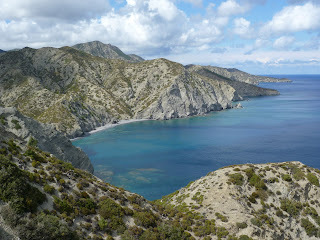



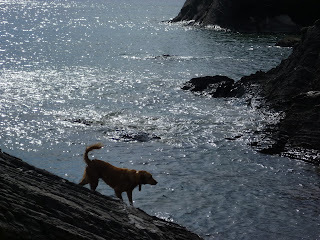
August 4, 2022
Tavernas by the sea

My new book, TAVERNA BY THE SEA: ONE GREEK ISLAND SUMMER, based on the time I spent living at lovely Ayios Minas in north Karpathos, is now at the printer, and I’m thrilled about it.
I started writing it during the winter in Karpathos in 2017 when the memories were still fresh but then ended up being diverted to focus on the more serious WILD ABANDON: THE DESERTED PLACES OF THE DODECANESE. I’m very glad I wrote that book, but I’m also happy that I went back to finish TAVERNA BY THE SEA last year and that Bradt decided to publish it.
The book shows the fun side of how I got stuck in rugged north Karpathos for longer than expected, but it also reveals what summer is like for the locals who work behind the scenes non-stop, while making it all look easy and relaxed.
When I posted something about it online recently, one of my Facebook friends told me he’d also had a fun summer working at a Greek taverna by the sea years ago, so I decided to interview him about it – and was delighted by his story. Here it is - complete with his pictures from the time!
Jen:
So, hello Paul! You ran a taverna on the island of Aegina in 1996 – wow, that’s interesting. How did the opportunity come up?
Paul:
I was working with a friend at a restaurant in Reigate, Surrey back in 1996 and her parents had received a small inheritance and decided that they would love to buy a little bar/restaurant in the sun and have a nice relaxing lifestyle. They had ideas of not doing much work: the wife would be swanning around with a glass of wine in her hand chatting to customers while the husband served a couple of beers at the bar to the one or two old local guys, and they’d spend a day or two at the beach.
The reality was to be completely different – it was very, very busy! The husband was stuck in the sweltering kitchen all day while the wife ran herself ragged around the restaurant. It was not the sort of relaxed retirement dream that they thought it would be. They ran it for two summers then realised how much work it was, and decided to rent it out.
Jen:
What made you take on the challenge?
Paul:
I find myself to be a rather restless soul and I have always wanted to do different things and not get bogged down into a routine. I like a challenge and to push myself out of my comfort zones and this opportunity was definitely something that was exciting and slightly scary. My mother is Maltese and I guess I have inherited her love of the Mediterranean sun and sea so as soon as I heard about the taverna I just knew I had to do it!
Jen:
So you set off for a summer on a Greek island.
Paul:
I bought a very cool VW camper van, then got two friends, a chef and a waitress, and we drove down through Europe to Agia Marina on the island of Aegina, to open the taverna and run it for the summer. It was a great road trip.

Jen:
What was the location like?
Paul:
The “Lanterns Taverna” was situated about a five-minute walk outside the main town of Agia Marina in a place called Alones which was just a sprinkling of houses, not even big enough to be called a village, nestled in between surrounding low hills and about 900 meters from the sea. Although it was a quiet area we were extremely busy throughout the summer mainly with tourists.
Jen:
Did you speak the language? What kind of food did you serve, and how did you learn how things worked there, where to order supplies and so on?
Paul:
I didn’t speak any Greek before I went out so had to learn very quickly. To start with I managed to get by with lots of gesticulation and a phrase book. By the end of the summer I found I could converse in Greek – as long as the conversation was all about catering!
The menu was small and mainly Greek but I did try to vary it by doing burgers, steaks, BLTs and different salads. We also did a Chinese night every Monday which surprisingly went down very well.
I did have a little bit of help when I got there to learn how things worked. An old Scottish guy who lived on the island and was a friend of the owners met me when I arrived at the taverna with the keys and spent the day telling me where to buy most of the supplies and introduced me to a few of the suppliers. He was quite a bolshy and pushy character and right from the start tried to tell me how to run things and what to do – I guess he saw me as a naive young whippersnapper and maybe wanted to have a say (and some of the profits) in what went on. I “sacked” him after about two weeks.
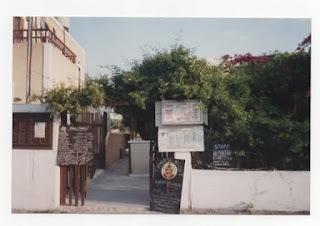
Jen:
You said it was a great summer and you totally fell in love with Greece. If you were working such long days at the taverna, how did that happen?
Paul:
We worked all day seven days a week, as I'm sure you'll know. We didn't really have much money behind us and didn't save anything while we were there – we just lived off the daily profits paying for our accommodation and spending the rest on having fun.
We opened for breakfast, lunch and dinner and didn’t close until the last customers left – which, as they were on holiday, would normally be about 2 or 3am. After that the staff and I would walk down the hill back to our apartments – but due to the Greek custom of ‘philoxenia’ we found that we couldn’t simply walk past the other bars/tavernas without being called in to have a chat and a drink. It was a great way to meet the locals and make friends – long days, long nights but great, great fun!
Philoxenia was one of the main reasons for falling in love with Greece. I did worry before I went that the Greeks may not like a foreigner in their midst running a taverna and that I might be shunned but I found that I was made welcome and felt relaxed from the first day I arrived. The scenery of low scrubby hills around me was beautiful, I loved the feeling of the heat all around me and of course the little bays and beaches with the flawless warm Mediterranean blue sea.
I closed the taverna at the end of the season and decided to go home as my job was still available at the restaurant in Reigate. I do still wonder why I decided to come back to England when I loved Greece so much. There wasn't much work on the island in the winter but I'm sure if I spoke to my Greek friends they could have helped me and I could have probably stayed and started a life in Greece.
Jen:
Thank you, Paul, for sharing a little of your story! Here's to tavernas by the sea... Oh, and just as I'm posting this, I've received the first mini-review of my book in Wanderlust magazine...

June 9, 2022
A New Twist in an Old Tale

One morning a few months ago, I woke up to a message from a woman called Barbara in Chichester, which is where I was living before I moved to Tilos. I didn’t know Barbara, but she had an unusual reason for getting in touch. It turned out we have a strange connection.
In May 2009, six months after turning forty, I spent the month alone in Tilos and decided to try to live on the island. Determined to make it happen, in the meantime I returned to my job in Chichester. I’d known a man around my age called David Cairns as a casual friend for a couple of years and always enjoyed chatting with him, but one night that summer we had a deeper conversation which led to us starting a relationship. If you’ve read my book Falling in Honey, you’ll know some of this already. In the book I called him ‘Matt’.
We had simple fun – he read books and we explored, he was always making me laugh and buying me dinners and clothes I’d never have splashed out on myself. But we were also serious from the start about trying to have kids, and we got engaged. He had two daughters – he kept their photo on him always; he currently wasn’t able to see them but sent regular maintenance payments, and I encouraged him to work towards having more contact. Dave had a few properties which were rented out since he often worked away, he said, but he decided to spend more time at the local factory he owned so we could be together and moved in with me, which made me happy. After I introduced him to Tilos, he loved the idea of us moving together, and he put in an offer on a house here.
By April 2011 I’d given notice on my job, confident about going freelance. Dave was spending those days buying things he’d need for life on Tilos – a new laptop, summery clothes. His purchase of the Tilos house had stalled but I arranged for us to rent a place. My last day at the office coincided with our appointment at the fertility clinic – we’d been having tests to find out why I wasn’t conceiving. Dave called to say he couldn’t make the appointment but had to talk to me. In tears, he confessed that he’d been lying to me about everything, every day. I later found out he'd been stealing money from his workplace and using credit cards.
Thankfully, I had no problem moving to Tilos alone. The episode was weird, shocking, disorienting, saddening – but I put it behind me. When it became an unusual twist in the book I was writing about moving to Greece, I disguised Dave’s identity a little and never referred to Chichester by name, only as a ‘town on the south coast of England’. In the media articles that came out around the time of its publication, I wouldn’t use his real name or photo. I believed he needed psychological help, not public shaming. The story is much more complex than I can sum up in a few hundred words.
All of it seemed well in the distant past when I received the message from Barbara. She’d found me after a friend showed her a Daily Mail article, still online, that was published after Falling in Honey came out.
Barbara’s vivacious, outgoing and sociable, has children and lots of good friends and works at Chichester College. A few years after I left to live in Greece, she met Dave Cairns and they became a couple. ‘We had an amazing life. My friends and family loved him,’ she wrote. Dave told her about the property he owned and his job, and it seemed they would have a happy and secure future together. He explained that he wasn’t able to see his children but ensured they were looked after.
‘He wrote down how much he had in his savings, plus the money he would get from his house plus his pension.’ They got married and rented a lovely flat together in the town centre. Then he told her he had sold the property he owned by the canal, and they put in an offer to buy a house together and had it accepted. They celebrated and put the news on Facebook. He messaged a friend to ask for help with moving, and another to say their rented flat would soon be available.
‘It was the next day when he should have been at work that he messaged my friend to say that he had packed a bag and was going to leave because he had lied to me… He was very drunk.’
When she wrote to me, two days after learning she’d been deceived for six years, she was devastated. She had loved him and trusted him, and as well as lying to her, he’d been spending her money.
‘He spent £27,000 of my money that I put in his name in premium bonds, and I took out two credit cards [for him] in my name.’ He claimed he didn’t want to take out a credit card in his own name because his ex-partner, the mother of his kids, had forged his name and racked up huge debts. When he paid Barbara his half of the rent every month, it came from her own premium bonds – he’d been taking out large sums. He took about £34,000 in total but the police said she had no case against him. ‘I want to warn others never to put money or credit cards in any other person’s name… I can’t believe he has no remorse at all.’
She found out he didn’t even have children – something I’d always wondered about. One of her colleagues happened to know his ex-partner and messaged her to find out. She said the children weren’t his. Barbara met up with Dave a week later and asked him. ‘He admitted that it was all lies.’
She was ‘numb with disbelief’, as if someone she knew had died. It all sounded very familiar. As before, he left with hardly anything and slept rough for a while. I remembered buying him food and a sleeping bag. A few weeks later, she wrote to me:
‘I don’t believe we are going to be the only people he hurts… I am coping but just very sad… Sold wedding ring and engagement ring today.’
I felt guilt that I hadn’t done more to expose him at the time, but also angry. How did he get away with doing the same thing in the same town using the same name?
A friend who had known me and Dave when we were together got in touch after she heard he had struck again. She had started working at Chichester College in 2017 and got to know a few women in the staffroom. One was talking excitedly about their impending marriage to a man named Dave. It was only when she attended the after-party for the wedding that she realised it was him. She was shocked and tried hinting to friends that he was bad news.
‘They told me people change and I really thought he had got help and was sorted. I thought long and hard but decided it was not my place… A couple of times I did ask him outright if [Barbara] knew anything – he said she did.’ But he was lying. Then he discredited her, suggesting she was crazy.
Dave is very clever at manipulating people – getting people to like him. And people do like him. We all did. But he can’t help himself from lying needlessly. He then contrives to keep people apart so they can’t compare facts.
Another acquaintance, who has known him for years through the factory he worked at and stole from, said that years ago, before he met me, she discovered he was lying to colleagues. ‘He told us he had just had triplets – my mum even bought them all outfits! He told us he bought a big house at Southbourne – he hadn’t, I rang the estate agents to check. He said he went on holiday to Iceland – he didn’t as he didn’t get his first passport until a year later. I could go on…’
When Dave met Barbara, this friend asked him if he was behaving properly now, and he told her he was. She was very sorry she didn’t say anything directly to Barbara earlier. ‘I really thought he may have changed but sadly not. I think he needs to be stopped from doing it to someone else.’
When I got to know Dave, I was a recent incomer to Chichester but there were people around who’d known him for years and I assumed someone would have warned me if there was anything to be concerned about. I’ve now dug a little deeper and spoken to someone who went to the same high school, Chichester High School, though he hasn’t spoken to him for years. He said another friend was in the same crowd when they were in their teens and claimed not to know him that well. But both agreed that Dave, fond of telling stories about a military past – stories that he also told me, saying the subsequent trauma explained the self-harming scars on his arms – showed signs of being ‘a fantasist’.
Before speaking out, I waited for Barbara to get legal advice and try to recoup some of her losses; he promised to get a job and start repaying her, but she says that’s no longer happening and he’s spending a lot of time in the Wetherspoons pub. Another friend wrote: ‘We saw him several weeks ago in town… dressed up like a country gentleman.’ He’s been spotted having changed his appearance, happily wandering around Chichester with shopping bags, showing no sign that he understands the severity and repercussions of what he’s so recently done.
Barbara’s a remarkably strong woman. She’s found a lodger so she can keep on her flat, has been doing three jobs to keep her head above water and take the holidays she needed. ‘I am exhausted and have been really down at times but I have dragged myself out of those times… I’ve been lucky to have amazing friends and family.’
But it’s important to reduce the chances of this happening again. Back when Falling in Honey was published, a number of men and women got in touch to say something similar had happened to them. Please talk to people, share this however you can.
*Photos from 2010...

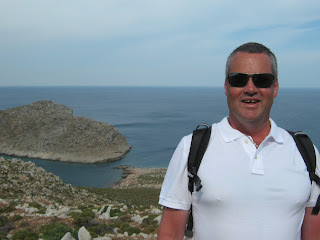
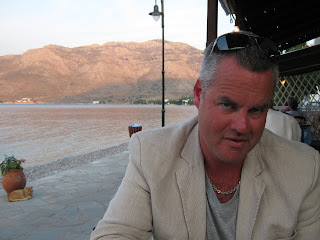

May 12, 2022
Meet the President

My life on the little Greek island of Tilos mostly revolves around my dog, the sea, my garden, walks, swims, nature and my island neighbours, writing and editing books – which is how I like it and I feel grateful that is the case. I’d never really paid much attention before to the role of the president of the Hellenic Republic. And while I used to do formal meetings for my job a lifetime ago, now I prefer underwater meetings with moray eels and octopus…
But for a few days last week, the first item on my to-do list read: ‘Saturday 1.30, meet the president.’
It started when a message arrived on Thursday morning from Stathis in the mayor’s office. ‘The president of Greece is coming.’
‘I know!!’ I replied, excitedly. I’d heard rumour of it, though maybe for reasons of security I hadn’t seen any announcement, just a brief mention. The reason seemed to be our official status as Greece’s first ‘zero-waste’ island, an initiative that aims to recycle and re-use nearly all the island’s rubbish.
Privately funded by PolyGreen working in collaboration with the municipality, the scheme seemed very ambitious when first announced in a meeting in the square. But much happened last year to prepare, and over recent months young people employed by PolyGreen visited every home on the island to explain how it works. The element of education is important, bearing in mind that in Greece, ‘recycling’ bins are regularly filled with normal rubbish.
Now on Tilos bins have been removed, electric vehicles collect from each household several times a week, and everything is sorted to be shipped away for ‘circular waste management’.
But Stathis didn’t mention this. What he said was that the president of Greece was coming and wanted to meet me. Strange things happen sometimes, I’ve found, when you write books on a small island. Still, it seemed very odd. He asked me to come to the square on Saturday where the president would have a ‘relaxed conversation with citizens of the island’, which sounded more realistic, although not particularly ‘relaxed’ from my point of view.
It was a good pretext for learning something about the president of the Greece a.k.a. the Hellenic Republic, however. The role of Proedros tis Ellinikis Dimokratias was established in 1975 when Greece became a presidential parliamentary democracy; elected by parliament but with mostly ceremonial powers, the president is the official head of state and the commander-in-chief of the Greek armed forces. Katerina Sakellaropoulou, a lawyer and judge, became the first woman president of Greece in March 2020. Photos showed her sometimes looking appropriately fierce and sometimes with a kind, wry, rather cute smile.
Amazing! I was looking forward to seeing her on Tilos, and joked to Ian that maybe she could make me an honorary citizen of Greece, like Victoria Hislop…
On Saturday, I woke up listening to the waves, and the birds; the wind of the last few days had dropped and the sky was a deep blue. It was a beautiful day. Then I received another message from Stathis saying I was invited to join the president at her table. I was honoured but petrified and wanted to learn more. ‘We’ll talk in the square,’ he said.
I tried to continue my morning in the usual way. In the garden, I cleared some more of the winter weeds that grew while we were away in Romania, and planted some seeds. It was hot and we went for a swim – I tried to read a few pages but couldn’t concentrate. When we came back a farmer’s red truck was by the gate, and I bought some vegetables. Then I put on a dress and sandals in lieu of my usual shorts and boots, and drove off to meet the president.
Other people were going about their day in the usual way too, it seemed, until I approached the helipad and saw a Chinook recently landed, a few locals standing around it.
In Livadia, the post office in the square had got a fresh lick of paint, a peach colour with burgundy trim, and the scruffy old noticeboard on the harbour sported a new ‘zero waste’ sign. People were dressed up and bagging tables in the shade – which were covered in the usual way, alas, with plastic water bottles and plastic frappe cups…
Time ticked on, and the youngsters chosen to make a presentation wearing the full traditional dress of Tilos, long layers of embroidered wool, looked listless… Then dark cars drew up and, accompanied by a security man and important-looking personages in full military regalia, there was the petite figure of the president of Greece in a stylish white jacket. Everyone clapped as she strolled through the square greeting and talking to people.
Half an hour later, at Michaili’s Taverna, with butterflies in my stomach, I was ushered to a place at a long table next to our mayor Maria Kamma, and then the president of Greece, Katerina Sakellaropoulou. I was even introduced to her, and although I was too nervous to say anything interesting at all, I was able to present her with a copy of my last book, Wild Abandon, and she was gracious enough to examine it, ask some questions and ask me to dedicate it to her. I’ve never dedicated one of my books to a president before. So if you own a copy, you’re in good company…
There were presentations of other, more official gifts, by our mayor Maria.
‘Exigiseh to elephantaki!’ - explain the little elephant! - hissed the lawyer of the municipality of Rhodes to Maria as she stood there with the unenviable task of gifting a cumbersome metal statue of a Tilos elephant.
‘Eh, vevaia, of course…’ she replied.
The president drank white wine with ice (‘the colder the better’, she said, because it was a hot day, though maybe she’d had bad island wine before…). The table was heaped with salads, courgette fritters, fried calamari, tiny shrimp and huge fresh fish… I’m not sure if the president didn’t like the tiny shrimp or is just an animal lover, but at one point I spied her feeding some to the cats.
I listened in to conversations. The CEO of PolyGreen, Athanasios Polychronopoulos, talked about the zero-waste programme to the president. ‘We have to change many minds,’ she said seriously. He explained how he had chosen to implement this initiative on Tilos because of the openness of its community to embrace change; there was talk of the first gay weddings in Greece and how the island had handled the Syrian refugee crisis.
There was also plenty of banter. The Regional Governor of the South Aegean ordered a plate of goat, and the owner of Eleni Beach Hotel smilingly declined to taste it because it was from the other village, Megalo Horio.
Sadly, my Greek felt rusty from my time in Romania and my nerves kept me quiet (honestly!), afraid to make some terrible faux pas. That said, when dessert arrived and the restaurant had run out of plates and spoons and decided to provide plastic ones instead, I felt I had to speak up and say no thanks to unnecessary plastic!

President Sakellaropoulou demonstrated great poise and knew how to say and do just the right thing. Before she left, she had some photos taken. She stood on the steps of the taverna after lunch with the ladies who’d provided it, and made sure everyone was in the picture. She even asked to have her photo taken with me, but I haven’t managed to get a copy of it.
And then she was gone, and I went and had a swim and relaxed.
And now the next things on my to-do list are the more usual work items, tax return and reading the proofs of my new book… But I don’t think I’ll ever forget the day I met the president.
Here are the wonderful official photos of the president visiting Halki and Tilos:
Επίσκεψη στη Χάλκη και την Τήλο – Προεδρία της Ελληνικής Δημοκρατίας (presidency.gr)
President – Presidency of the Hellenic Republic

April 25, 2022
A Dog in Drapetsona
A dog was barking in Drapetsona. It had been barking for a few hours. It was evening, and I could also hear the neighbours’ television through the walls, and the engines and announcements of the ferries.
I’d searched on Airbnb for a place to stay overnight in Piraeus before taking the ferry home to Tilos. I was delighted to find a dog-friendly house within walking distance of gate E1, the dock for Blue Star ferries to the Dodecanese. And it was on St Fanourios Street: my favourite saint, the finder of lost things. I booked it, and Savvas arranged a transfer from the airport with Mr George.
The plane had been delayed a little, and on arrival in Athens there was a vast queue for non-EU passport holders. I felt anxious thinking of Lisa waiting in her crate. I eventually made it through, released Lisa and dragged all our things outside. My backpack was heavy with the winter clothes I’d taken to Romania. Now it was Easter.
Mr George had been circling the pickup area for a while. He turned out to be driving a very small car, and with an attendant trying to move us on, I didn’t have time to dismantle the crate. We somehow squeezed everything in, then Lisa sat happily at my feet with her nose out of the window, and an hour later I was thrilled to see blue sea. Finally, we arrived at a terraced house in Drapetsona, on a small hill above the port.
Savvas welcomed me and showed me around the house which he’d described as ‘old-style’ and ‘homely’; it had been his grandparents’ house and was now his. Like all the houses on the street, it was a two-up-two-down terrace with a little garden in the front and the back. Savvas said there were lots of cats. It smelled a bit smoky but I knew I was back in Greece when I found in the kitchen cupboard a small water bottled filled with aromatic olive oil.
I was excited to spend the afternoon exploring Piraeus. Drapetsona didn’t seem the easiest neighbourhood to navigate, though, at least with a dog. The pavements were a bit smelly and broken, and I was abruptly reminded that in Greece pedestrian crossings are meaningless, seen by some drivers as a challenge to speed up and mow you down. I was tired from a few days of travelling and I needed to adjust to the city after six weeks away in a rural, mountainous area of Transylvania.
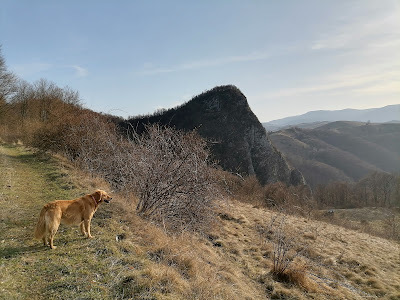



There, we’d been staying in a wooden cabin at the end of a steep-sided, forested valley with a monastery above and a river below that gushed out of a cave. Any livestock in the area were kept behind fences or protected by shepherds because of the threat of wolves. With no roaming goats or sheep, Lisa could be off the lead all the time. Seeing her racing around the hills was a joy for me as much as for her.
Someone told us that in Romania, ‘a village isn’t a village without dogs’. In our area, some had owners and some were strays, but they all wandered freely and had tight little communities which they organised along their own lines. We’d often be joined on walks by the two strays we fed, but just as often by dogs with owners that just fancied a walk with company. Lisa thrived on it. People seemed to love animals and the few cars around slowed down when the drivers saw dogs on the road.
Ian had discovered the place as a new refuge for his extra-Schengen adventures. For his first month there, the water in the pipes was frozen and had to be brought from the spring or the river. Lisa had loved the deep snow when we got there in March. By mid-April, the days were warm enough that I took a very fast dip in the cold river, I’d started learning a bit of Romanian and those empty hills and rural places were beginning to feel like another home. But it was time to leave Romania for now – Lisa and I to Greece, Ian for now to Bulgaria.
Dogs are welcome to travel on trains in Romania for a half-price ticket, which costs barely anything. It was around two hours to lovely Sighisoara, where we stayed in a historic building on the edge of the citadel and I found a ‘cabinet veterinar’ where a very gentle vet stamped Lisa’s passport saying she was fit to travel.


We continued for a long six hours by train to Bucharest, yet in comfort and with views of lovely farmland and snowy mountains. Back in March we’d stayed at Old City NF Palace in a vast room with a chandelier. The exceptional young staff had organised to keep Lisa’s airline crate in the left luggage of the hotel until the next month, which meant we could travel across the country unencumbered. Now we were reunited with it and had one last night there. I almost wished we could stay longer but was excited to get home.
Because it's not so easy or pleasant to travel by train with a dog in Greece, we were flying. Checking in for the flight to Athens, I met a Romanian woman who was travelling with her dog back to Greece where she lived – and speaking to her dog in Greek as he was from there, like Lisa. They met with much tail-wagging, and hopped in their airline crates together. I remember how much trouble Lisa used to give me getting in there. Now she knows it’s OK, and although I still worry for her, I know she’ll be OK too.
On the short flight, in Aegean’s in-flight magazine Blue I was pleased to find a feature on Piraeus. I jotted down the addresses of interesting-sounding shops and eateries. There was an ‘art hub’, someone making furniture from reclaimed marble, someone making furniture out of recycling plastic nets and other plastic waste from the sea. When I got online again and looked up BlueCycle, alas, I was sad to see a coffee table cost 650 euros.
Nice idea, but unlikely to have a big impact.
So, by the afternoon, I was in Piraeus.
There was something in the name of the district, Drapetsona, that sounded like something else and made me wonder about its history. I looked it up and found what might be a link to Trebizond, now Trabzon, in north-eastern Turkey on the Black Sea. Founded by the Greeks in the eighth century BC as Trapezunda.
I tried figuring out the best route to take to the ferry the next day. One way the pavements were narrow and the roads busy, which would make it impossible to trundle a huge crate and hold a dog safely on a lead. The other way went past an archaeological site and an abandoned building along a road so quiet that it seemed to be used exclusively by driving schools, but at the end was a system of roundabouts where even the drivers seem unsure which way to go, and when I attempted a trial run with Lisa, aggressive stray dogs dashed in front of juggernauts to snap at our heels.
It was a bit intense. Being tired wasn’t helping. Deciding to leave the discovery of the interesting shops and art hubs and eateries for now, I did some shopping at the supermarket around the corner.
I tried taking Lisa for another walk later but she got spooked by some almighty bang that sounded like a very loud gun. It was already Easter week, and everything from firecrackers to dynamite is deployed in the Greek celebrations, making it a time of misery for many dogs and their owners. I left her in the house to snooze, and went for a wander down side streets for half an hour until I reached, amidst some abandoned industrial buildings, a park that ran down to the sea. It would be a perfect place to take Lisa tomorrow. I returned feeling curious about the area again, opened a bottle of wine and studied the map.
It was a little later when a message came through from Savva, my host, telling me that the neighbourhood was one of the poor neighbourhoods of Piraeus, ‘where our grandparents came from Turkey from where they were kicked off in 1922’. Of course – these were some of the prosfygika, houses built for Greeks from Asia Minor who came here as refugees.
It was a hundred years ago that the complex and terrible events of war between Turkey and Greece led to what is known as the Asia Minor Catastrophe, when many lost their lives in Smyrna and other cities with Greek populations. This was followed by the population exchanges along religious lines, ending thousands of years of Greek Orthodox presence in Asia Minor, as well as Muslim presence in Greece. It made refugees of many thousands of people, who had to leave behind all they had, as so many Ukrainians are doing today.
The people who came from Asia Minor a hundred years ago doubled the populations of Athens and Thessaloniki. As Auguste Corteau wrote in The Book of Katerina:
‘… in Samsun, Turkey … at the beginning of the 1920s the Konstantinidis pack is practically well-off: the girls at a good school with piano lessons and foreign languages, meat on the table every day, and thanks be to God. And then the Asia Minor Catastrophe happens and they suddenly find themselves in Upper Town, Thessaloniki, without two pennies to rub together. Gentleman and businessman Dimitrós is overnight a spawn of the Turk, and young Irini, who used to be at the top of her class, is suddenly cast amongst smart Greek girls who look down on her and whisper behind her back: “Her family lives in a shack. Can you imagine?”’
Savvas sent me another message.
‘Nowadays the area is still poor but authentic persons are living there.’ He said the people who came from Turkey were given small temporary houses and in 1974 the state gave them the opportunity to live in these houses – I guessed he meant to keep them.
‘In this neighbourhood is born the rebetiko,’ he said, referring to the underground blues-type tradition of music. And the film that made Melina Mercouri a star, Never on Sunday, in which she plays a happy, romantic prostitute, was set here. The song in which she sings of the magic of her favourite port was ‘Ta Pedia tou Pirea’, the Children of Piraeus.
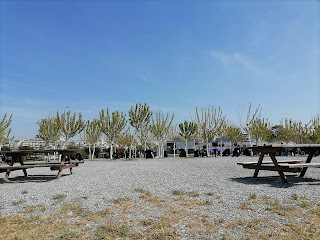
Next morning in the sunshine, workmen were painting next door and neighbours passing one another calling Easter greetings, ‘Kali anastasi na echoume!’
Feeling happy to have learned a little more about the history of the area, I walked Lisa all the way along Ethnikis Antistaseos (‘National Resistance’) Street, past nice neighbourhood shops selling bougatsa or wine from barrels, to the park covered in wildflowers that led down to the open sea. There were rusty ships in a harbour, and an abandoned factory. I’d noticed the name of the area was Lipasmata – ‘Fertilizers’. It was the site of a fertilizer factory, part of Piraeus’ industrial past, and in recent years the land has been allowed to re-wild and turned into a park with a couple of cafes looking out to the big blue and the islands.
Lisa was desperate to find a way into the water – and she did. An attendant said, ‘All the animals do the same!’ People of all ages were strolling and enjoying the sun and sea breeze. Dogs had to be on leads, another attendant told me later, but you can't have everything. By then at least she'd had a run around. She'd be more relaxed for our onward journey to our island home. What a wonderful adventure we'd both had.
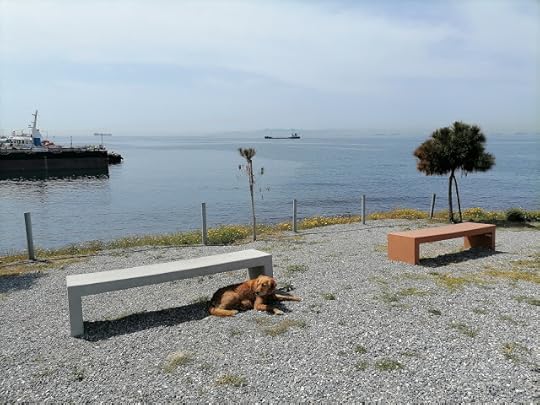
January 31, 2022
Wine and White Sand in Winter: The Kos Trip
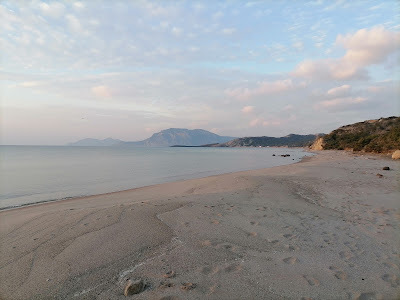
It was mid-November, and I was nervous as I prepared to leave for Kos on the wine trip. Wine doesn't usually make me nervous, but I’d never driven a car onto a ferry before.
One evening in Tilos I had been thinking about sourcing some good organic wine, preferably from a nearby island (as no-one sells it here). I used to order from Embona in Rhodes, but then I remembered I’d found good stuff on Kos. I did a little internet search and found not one but two organic wineries in the middle of the island. I tried emailing Mesariano and received a very helpful response in English listing the different wines and prices; they had no problem sending to another island but the shipping cost was a little steep. This gave me an idea…
A couple of years ago, I’d taken a flight that passed over the western part of Kos, and looked down to what looked like a long stretch of wild beach. It seemed somehow unlikely on an island known for embracing touristic development, but there was no sign of hotels or villas. It stuck in my mind that I’d like to take a closer look.
And so, I had two perfect excuses for a trip. Oh, and a third – my new tent needed testing! I just needed to overcome my fear of driving a car on and off a big ferry, so that I could get to the places with Lisa – since dogs aren’t allowed on buses there – and transport the wine.
‘Eineh evkolo,’ it’s easy, said Stelios in the ticket office as I mentioned it was my first time and asked if there was anything I should know. I was lucky in one respect, though: the ferry schedule had been disrupted by a strike, so the big Blue Star that would normally travel late on Friday night had been delayed until 2pm Saturday afternoon, and was less busy than usual, and certainly less busy than in summer or en route to Rhodes – less shouting and hand-waving to deal with and fewer vehicles to avoid as I drove on.
On deck, my anxiety turned to relief, I took pleasure in watching the rugged east coast of Tilos with its very few signs of habitation as we travelled north. There was sun as we docked at Nisyros, but it was already dusk when we arrived at Kos Town. Heading for Pantheon Apartments, a cheap and dog-friendly stopover, I got sucked into a vortex of narrow one-way streets and circled a roundabout three times. I realised I had no idea about parking rules, but since it was Saturday night I did like everyone else, and parked on the pavement in between a couple of trees.
I took Lisa for a walk around the old harbour walls and a medieval gate. I’d been hoping to do shopping in town but everything was closed, so early Saturday evening saw me at a café-bar I’d noticed but never visited before: Scholarcheio. It seemed a good sign that they had little bottles of organic red from Petra Marinou, the second winery I’d found online. I ordered a lettuce-and-pear salad sprinkled with tiny raisins and a plate of local sausage which I shared with Lisa. The place was packed by the time I left, the waiter rushed off his feet.
In the grey early morning I drove west, away from the nearby shores of Turkey, parallel to the ridge of Dikeos mountain, which I see from my house in Tilos. I saw the turnoff to Pyli, where I’d spent a couple of weeks wandering while writing Wild Abandon. I passed a little vineyard where the people used palm branches over their fence to shield it from the road – as I’d now done around my garden. I stopped briefly to pick up a few supplies in Antimacheia. The road became quieter, the surroundings more rural as I neared the narrowest part of the island before Kefalos, and randomly picked a rough track to turn off and leave the car.
And there it was: the place I’d seen from above, a long stretch of pure, pale sand, with juniper-covered dunes and low, sandy hills behind and only a scattering of houses. Heaven! On a cloudy but warm Sunday in November, we had the stretch of beach to ourselves. The sand was clean, the sea clear, the sun trying to break through the clouds. With no sign of sheep or goats around, I let Lisa run, throwing a ball for her to chase. I took off my boots and we walked far along the beautiful, empty shore. As the morning wore on, we ran into a few locals: a woman who told me she’d stopped swimming for the year in October, a couple with a young child and two fishing rods stuck in the sand, another man with six fishing rods.
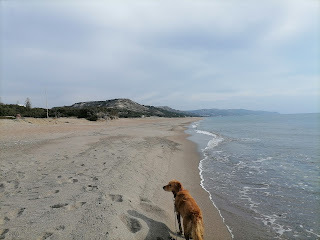
Beyond to the west, the headland of Kefalos at the far end of Kos rose up to four hundred metres and was deep green with trees. In the afternoon, I drove through the resort of Kampos and uphill to Kefalos village, under which a few caves in the rock were used for keeping chickens. I filled up my bottles with treated water at the Temak dispenser in the car park, and continued to see a little of the peninsula.
The sun came out as the road wound through hills and brought out all the colours of juniper and olive trees, heather and thyme bushes. I parked at Ayios Iannis Theologos and wandered along a track, enjoying a string of beaches with pure white sand and rippling blue sea, a breeze blowing from the north. There were farmers and the bells of goats and sheep.
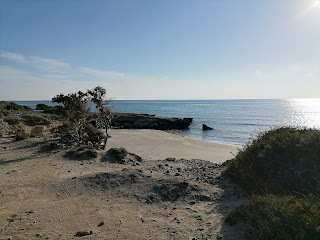
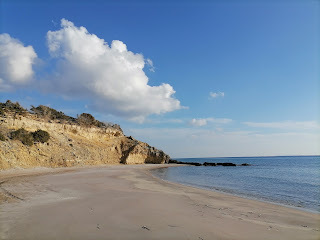
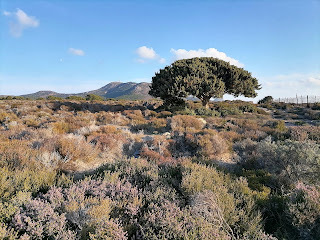
Returning to the village, I picked up dinner, then I drove back down to the protected south-facing beach. Sunset was magnificent; it was a long, cool night, but Lisa and I were comfortable in the new tent, and it was wonderful to wake to sunrise and the gently lapping sea. It felt so peaceful and special to be there at that moment.
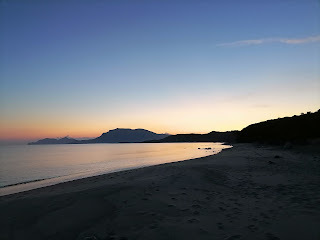

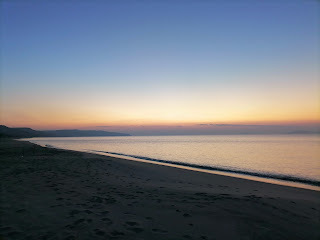
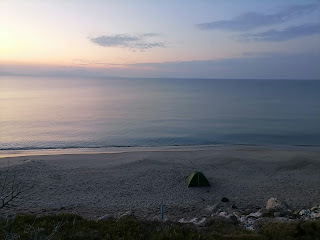

Before leaving this part of the island, I swam next to the ancient ruins on the edge of Kefalos-Kampos where years ago I swam out to the island. Then I wandered down another track and found Volcania winery surrounded by a beautiful, wild, open landscape. The sun was hot, someone was herding goats and their bells were ringing melodiously. In a farmyard with a few cows and chickens, a friendly man called his mother to show me around. Maria was around seventy and told me the area had all been farmland, divided up and given to the tsopanistes and agrotous, but then tourism came, and the work was easier, and most people gave up farming. She worked for twenty-five years for the local Club Med (!) and her husband kept the farm. I bought a few bottles of wine – it wasn’t certified organic but judging by the surroundings, it should be good – and wrenched myself away and to the road back east.
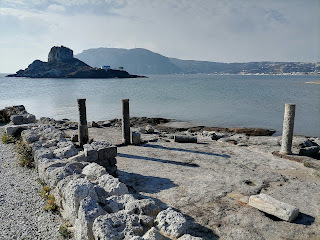
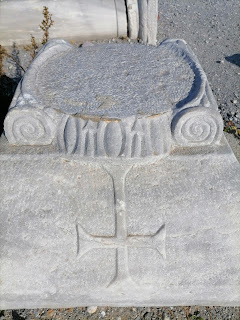
People were collecting olives and pruning their trees in the lovely countryside. I stopped and climbed a hill for a distant view of the impressive medieval fortress outside Antimacheia. There were tracks leading off in all directions and nothing at the end of them according to the map – I’d love to wander there some day.
When I saw a sign for Petra Marinou winery, I turned off the road and parked next to a coop of partridges and guinea fowl. The showroom was closed for the winter but the garage next door had a display. I picked up a few bottles of last year’s Chardonnay and Syrah for a good price as well as some new windscreen wipers and the man fitted them and agreed to check the radiator fluid for me. They’d have this year’s wine soon.
At last, I continued among now busy, fast traffic to Mesariano, finding it hidden behind a big Sklavenitis supermarket, pulled up in front of a beautiful marble Turkish fountain and was greeted by Nikos. It soon transpired that the perfect English in the emails was his son’s, so we spoke in Greek. Although he’d hoped to have plenty of time to show me around, he was busy with orders that morning as well as visitors at home – it was o nomos tou Merfi, he said: Murphy’s Law. I had a super-fast visit, and packed a few boxes of organic Cabernet and Merlot into the car.
Returning to Kos Town, I learned that most shops didn’t re-open on Monday afternoon. But what more did I need? I had a car full of wine, and had discovered some wonderful beaches. I ate again at the same place, where I arrived early and the waiter was making rakomelo and gave me a glass. I slept well, and early the next morning at the harbour I saw the orange sun rise from the sea. And what’s more, I was the only car getting on the Stavros ferry. ‘Tilos!’ shouted the crew to his mate. ‘Where do we put a car for Tilos?’
I wrote half this blog post while drinking a glass or two of the delicious Mesariano Grand Reserve (2017) two months later. I think I’ll need another trip there at some point. In the meantime, I've been finishing off my new book while doing more travels. Stay tuned...

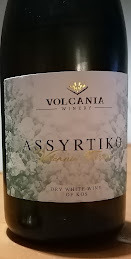
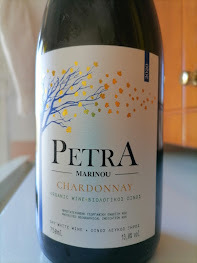
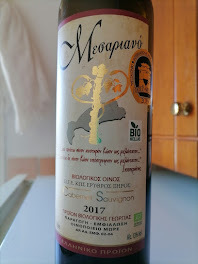
October 28, 2021
Looking for Agia Pelagia: Halki October Adventure Part 2
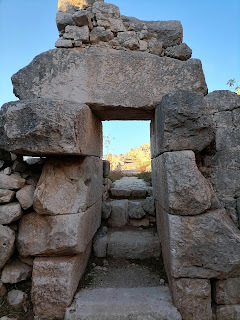
The peak of the hill above Halki’s abandoned village isn’t merely a medieval castle. Like the one above Megalo Horio on Tilos, this area was in ancient times - several centuries before Christ - an acropolis. It was exhilarating to wake up within its walls.
The only sounds were the humming engines of fishing caiques around the shores of Tracheia three hundred metres below, and a pair of birds again clackety-clacking and peep-peep-peeping to one another nearby. The sheer slopes below had the outlines of fields.
The pink dawn faded, and the clouds above the mountain of Attavyros on Rhodes glowed a fierce orange and then cast a golden pathway across the sea as the sun rose.
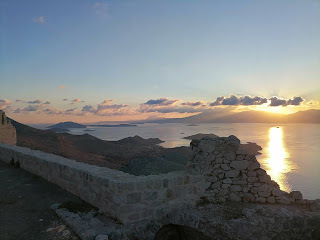

My head still full of strange dreams of people coming and going, I wanted to soak up the atmosphere, but had to pack up early in case anyone arrived. Then we heard distant gunshots: I didn’t know there was hunting on Halki. Lisa sought sanctuary inside the tent that was still wet with the damp of the night, abandoning ideas of breakfast or water. So much for lightening the load. I stuffed everything back into the pack and eventually coaxed her out.
Leaving no trace and taking only memories, we walked out to a spectacular view as the early sunlight turned the mountains amber, while in the shadows the rock remained grey. I could understand why the ancients carved thrones for the gods Zeus and Hecate here.

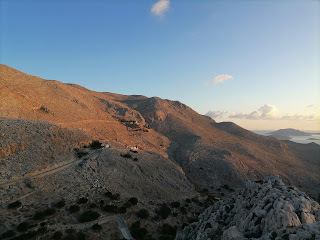
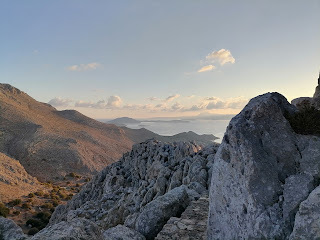

On the way down through the ruins of the village, I paused to look at the stone-built houses, a mixture of huge masonry blocks and careful stonework with bits of glazed pottery stuck in the plaster, almost all with their own sterna, a cistern for retaining rainwater. Goats and sheep wandered freely, and in the distance I heard a pickup truck heading up the road.

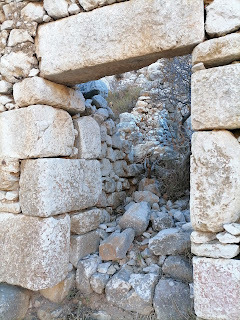

At the road, by a threshing circle I looked inside some of the kyfes, the old, stone-built shepherds’ huts. The outer walls were of smallish rocks, but inside they were massive, rough slabs of rock yet stacked and interlocking so intricately as they gradually arced up into a domed roof.


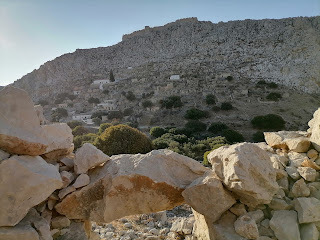
It was about eight thirty and already hot by then, and I still wasn’t sure exactly how far I would go. A team of men from the electricity company were replacing the wooden poles and the cables. As I set off uphill, an old man with a long beard rode past on a donkey, sitting sideways on a wooden saddle; I’d passed him the previous evening and wordlessly he’d indicated I should hold on firmly to my dog. A younger man rode by on a little motorbike; it looked like the man who’d told me to take the road slowly. Further up the road, I looked down and saw him feeding pigs and chickens in sheds made from reclaimed wood and doors and windows.

If it sounds busy, it wasn’t. For most of the way, it was very still and quiet, with partridges and goat bells, and the occasional gunshot far in the distance. I’ve walked this way a few times in different seasons and each time see a little more – the wonderful circular enclosures everywhere, most with a fig tree growing in the middle (for shade and food?). The sea was a silver shimmer back east towards Rhodes, a pale blue expanse south to the abandoned island of Saria very clear on the horizon.
It was good to have distractions. As the day warmed up a little and I was still carrying most of the food and water I’d brought, the road would rise about two hundred and fifty metres over a couple of kilometres. Already, when I looked back, the castle seemed far below. The road seemed tough and long, carved into the side of the mountain with nowhere comfortable to stop, so I’d keep going to the bend at the top. And there, I was excited to see the ruined windmill already – we’d reached the plateau and the road would level out. So I was already about halfway across the island – why I’d wanted to camp at the castle. Maybe I could keep going a while.

I looked out across the stony flat upland, so dry at this time of year, just an expanse of rocks, some of them piled into walls around fields, some piled into kyfes that were barely distinguishable except for the dark mouths of the doorways. I always find it a mysterious landscape – it feels like happening upon another world where people live in holes in the rocks.
Somewhere beyond the slopes to either side were the highest peaks of the island, according to my map, Profitis Ilias at 578 metres and Meroigli at 600. Across the dry plateau was the start of the steep path down the gorge to Ai Georgi tou Riakiou (I mistakenly called it Ai Yianni in my book, I now realised), where I’d arrived scarily dehydrated one May day and been extremely thankful to find water in an old cistern. I stashed a bottle of water and a tin of dog food in the windmill to pick up on the way back, and set off again on the gentle road west.
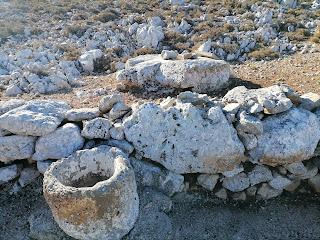
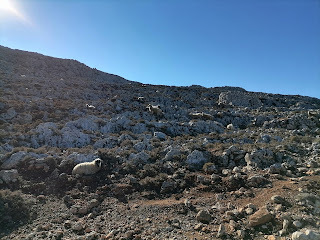



After a bend or two in the road with spectacular views down steep inclines and cliffs to the north coast, the land opens out again into another old agricultural area known as the ‘gardens’ with cisterns scattered everywhere according to the map – an area to explore another time – the monastery of Ai Yianni o Alarga, St John the Far-Away, was in sight.
The area beyond was what I wanted to explore – an old settlement with the church of Agia Pelagia and some kind of a beach. We stopped briefly for a drink of water and a handful of food at the monastery gates, where I noticed a sign: ‘Hunters are asked to please leave their dogs far away from the gate. Welcome.’
Last time here, we’d failed to find the start of the path, but this time I followed the instructions on the map and found it around the back of the monastery. From here, I knew I wouldn’t go far today. The paths weren’t clear enough. I still had enough food and water, but if I went all the way down to shore, I’d have to camp again to have enough energy to get back to town again. Doing that alone, when already tired, would be getting into a risky zone. And by now, Dioni had responded saying the apartment on the harbour was waiting for me.
But it was a joy simply exploring for a while, getting a sense of the dramatic and wild terrain, feeling the exhilaration of being alone at the empty end of the island. There were little pink flowers growing between the rocks, and eagles soared overhead. Every now and then, I’d come across a cairn demarcating a path, but they blended in so well with the rocky terrain, as did so many of the buildings that should have been landmarks, and were probably mostly knocked over by goats.
Following the hillside around to the north, I finally saw a chapel way below – Chrousi? That was probably the way I’d explore next time. We descended to one group of ruined stone huts – Vokolia? Heading south, we reached the sheer ridge where, according to the map, gaps through the rocks led to more ruins – so much to see. Too much for me today. Sometimes just looking for Agia Pelagia is enough.
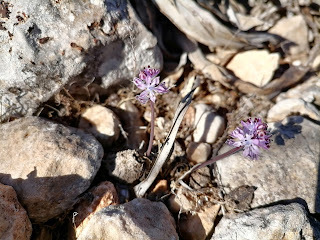


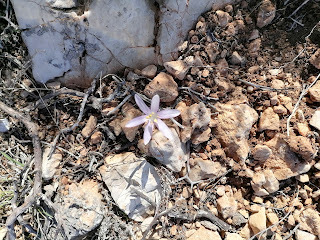


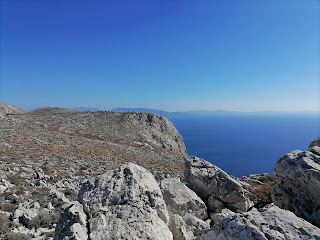
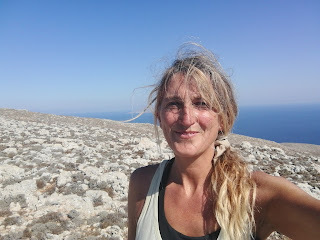

I made my way back up to the monastery, where the team from the electricity company were replacing the colones. The olive trees and cypresses were well watered at the monastery, and it was amazing to imagine what these uplands might have looked like when all the gardens were watered from the cisterns. Now it was so dry. Sheep wandered everywhere – what did they survive on?
It was a lovely walk back, eating and drinking as much as possible, though I still felt a little wistful to be heading back to civilisation. A taxi driver waved, taking a couple to the monastery. I stopped and put down my bag to walk up to what looked as though it could be a chapel, and found what I think was Ayios Lavrentios.
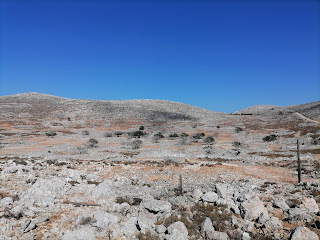
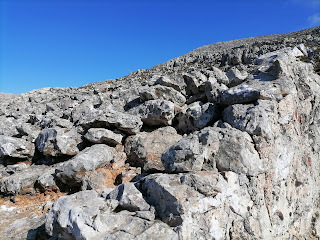

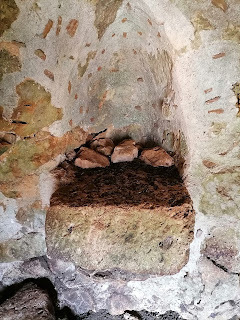
At the windmill, I saw a kestrel with a reddish-brown body and grey wings, and a flock of falcons were crying and circling high up. Finally Lisa decided to eat something. It was all downhill from here, and by four in the afternoon, we were back at Ftenagia for a swim.

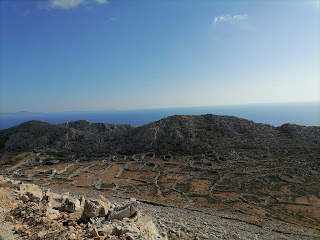

October 26, 2021
Looking for Agia Pelagia: Halki October Adventure Part I

The sea was dark blue and glittering, the land bare grey and brown as we rounded the south of Tilos. I love seeing my island afresh as soon as I get on a boat. There’s a different perspective from the sea. It’s good to get away, too, from the laptop and all the little jobs that I could always be doing around the house and garden, and just GO.
There’s something committing about taking a journey from an island – you can’t just go back. And there would be no boats to or from Tilos over the weekend. It was either this Friday lunchtime one or the late one if I wanted to go somewhere, and travelling in daytime is much more pleasant.
So I had decided to go to Halki with the Stavros, a big old ferry that currently plies a very useful route up and down the Dodecanese. It’s often late and puffs out evil-looking black smoke, but it’s a nice boat with plenty of space, my dog doesn’t have to wear a muzzle, and all for the very attractive price of nothing but the ticket office handling charge: 2 euros.
‘I’m thinking about taking the car,’ I had mused to Stelios Stefanakis as he processed my ticket.
‘Why? It’s only a little island!’ he scoffed.
‘But I’m thinking of going to the other side…’ I started to explain, but decided not to bother anyway. I wanted a bit of a walking adventure. This late October weather, sunny and warm but not too hot, is perfect for walking and I had a place in mind.
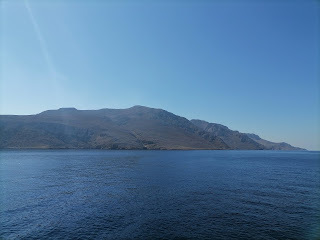


As we neared Halki, all the details of its north shore started coming into focus, the ridge and cliffs and gullies, some of which I’d walked before. It looked very empty and rugged. We passed the impressive new solar farm and then an hour or so after we’d left, the Stavros arrived at the splendid harbour of Nimborio with all its lovely painted villas, and Lisa and I felt like royalty as the only foot passengers to disembark. I walked straight to the bakery for a hortopita and a loaf of bread, then to Ftenagia beach to swim and relax for a couple of hours.
Because it had been a last-minute decision to go, I’d only sent a tentative email about a place to stay that morning. I checked on my phone and there was no email back yet, hardly surprising; this gave me an excuse to try my cheeky plan B, which was really a plan A. I had my new, lightweight tent cached in my bag, after all.
I stopped at a minimarket to buy two large bottles of water to supplement the supply I’d brought. There were three people sitting outside, two men and an older lady. I asked if there was water at Ai Yianni Alarga, the monastery of St John the Far-Away, towards the other end of the island.
‘Not at this time of year,’ said the older of the two men. Springs need to be fed over the course of the winter.
‘There is, but I don’t know if they have it open or closed,’ said the lady.
I told them I was thinking of walking there the next day. The lady advised I leave some of my stuff behind, indicating my heavy-looking rucksack. The man said it was OK to carry everything, but I should go slowly. I decided to take another bottle of water with me, just in case, and thanked them for their help.
In my book Wild Abandon about my journeys to deserted places in the Dodecanese, the short chapter on Halki is called ‘Road to Nowhere’. Once you leave the harbour village, there are hardly any houses or people. In some ways, taking the road to nowhere was going against my other aim, to meet locals and speak more Greek. But I also had a hankering to get away to nowhere for a while, as I sometimes do.
Soon after we set off, Lisa tried to convince me that the pine trees around the bay of Podamos would be a good place to stop. But even if it was tempting, I wasn’t carrying five or six litres of water, camping gear and food and everything else just to camp in a place with a catamaran moored in the bay and tourists on the beach. We continued up the road slowly, past scrappy fences with barking dogs, past the rubbish dump, past a young man making cement who said yeia sou (and I was so tired already that I weirdly replied yeia sas), up the slope and then the zigzagging ascent among olive groves. I noticed a little inhabited house I hadn’t seen last time. There were enough sheep and goats meandering about to convince me that camping in a field wasn’t an option – we’d never get any sleep.
Leaving the road at the start of the abandoned Old Village or Paleo Horio, we passed a few restored but uninhabited houses and continued more steeply, passing layer upon layer of ruined houses and chapels, to about 300 metres, where I happened upon a few French tourists heading down. We all mumbled surprised hellos.




What joy to enter the opening in the medieval walls of the castle and pass through the ancient gate with its huge masonry blocks. The sun was still a little way above the sea, and the light was glorious. I’m not sure camping is really encouraged, but there was no discouragement either and it was unlikely anyone would come here now, so I hurried to choose a sheltered spot and set up before night began to fall. To the east was Rhodes, but to the south an expanse of calm, pale blue sea, with the narrow-necked peninsula of Tracheia below. I watched the sun go down, and at twilight a couple of birds flitted about calling clackety-clack and then peep-peep-peep.


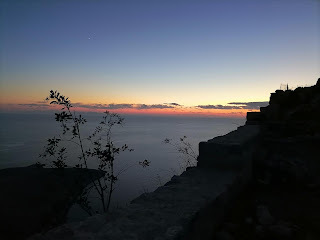


Lisa made a very good camping companion on her own camping mat in the tent. Still, it’s a long night when it’s dark from about seven in the evening until seven in the morning. I read for a while by the light of a torch, then lay drifting off, enveloped in the gorgeous silence, the only sound the gentle breathing of my dog lying next to me. Waking at one point to the sound of fishing boats, I unzipped the tent to bright moonlight and stars.
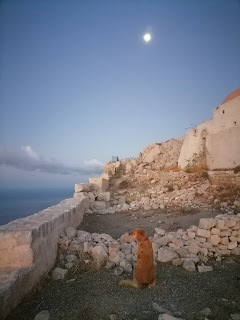
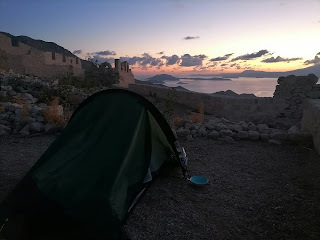
August 25, 2021
Last of the Summer Wine

There he was – the man I’d been looking for. Not in the sense of ‘all my life’, just since my grapes started ripening on the vine (and that isn’t a euphemism). I wanted to see if I could learn how to make very basic wine, and I’d heard Yiannis was a good man to talk to about it.
An unassuming man of medium stature, he was standing by his rickety old scooter. We’d last had a conversation early in the summer when he’d been encouraging me to pick mulberries from a tree on the road out of the village. A retired seaman who lives with his wife in Megalo Horio, he’s often out and about tending his beehives or fishing off the beach.
I’d gone to his house the previous day but although the scooter was there and the gate open, and although it wasn’t yet siesta time and I’d shouted hello in my usual hesitant way, there was no sign of life and I couldn’t get up the nerve to stride in. But now I’d spotted him on the road as I was driving to the post office, and I pulled in swiftly to the school car park.
‘I hear you make wine,’ I said, ‘and I want to learn.’
He smiled cautiously.
From late July to late August is grape and fig season, and I'd been told the grapes needed another couple of weeks on the vine, but one day, sick of having hornets buzzing around, I cut down most of them.
I’d done the same a couple of weeks before with the smaller, seedless grapes from a different vine and was drying them into raisins in flat dishes using 15 denier ladies’ hosiery to keep the flies and ants off while allowing enough sun to get in. The bigger vine in the front of the house gives good shade and the grapes are delicious. My old pal Antonis had asked if they were for eating or for wine. I had no idea.
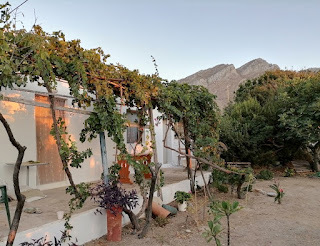
The fridge was already brimming with old wine bottles filled with grape juice, and old tahini jars filled with fig compote as well as caper leaves preserved from earlier in the year. Because I go easy with salt and sugar, I daren’t keep much out of the fridge, especially when the daytime temperatures in August were rising over forty Celsius and dropping at night to a mere thirty.
I’d been so excited about having my own vines and fig trees when I got this garden. And really, I am. Everything is getting healthier now after a few years of neglect and being attacked by goats. But it does demand quite a bit of time and attention over the summer. I’ve got more advanced this year with the produce, baking the fig compote and fresh raisins into cereal bars with oats and seeds. I’ve roasted lamb chops with grapes, figs, tomato and onion. I’ve made pizza with two kinds of local goat’s cheese, ripe figs and rocket from the garden. And I've regularly had icy fruit smoothies for breakfast.
So now I’d been stuffing masses of fat, juicy grapes into the fridge and hopefully thought I’d try again at winemaking. I’d really meant to go to Embona on Atavyros Mountain on Rhodes, talk to the experts and get the right equipment, but somehow it never happened, so here I was at the last minute asking Yianni.
He had already squeezed his grapes and started his wine, he said, having experienced the same problem with hornets. Some people leave the bits of skin in during the first days, but he removed them and used only juice. He mentioned a piestirio, a press; I’d been using my hands.
‘So you leave it for three days,’ he said, and although I didn’t understand what he said happened for those three days, from my Wiki research last year I know it’s when the stuff starts fermenting. I’d actually already tried a batch and the kitchen smelled like a bakery when I walked in. ‘You put it in an open container,’ he continued.
‘Covered with a cloth?’ I asked.
‘Yes, a cloth with holes, like the stuff they use for bonbonieras.’ Something gauzy, like the stuff they wrap baptism gifts in, to let the air in and out.
‘So what do you do after the three days?’ I asked, thinking I’d missed something.
‘Nothing,’ he said, leaving me puzzled. ‘After, you leave it for forty days. In the house. Then you try it. Ama yinei,’ he said, pausing – then he made a fist and brought it towards his mouth, the thumb sticking out like a spout heading for his lips, and tipped his head back.
When it's ready – if it works – you drink it.
I smiled, asked a few more questions, and thanked him. I could give it a try, I supposed, though I wasn’t entirely surprised when he added that a neighbour had lost his whole batch of wine for three years running. Maybe Yiannis was cannily keeping the real tricks to himself. I got back in the car and drove down to Livadia. As so often happens, a quick trip to the post office was about to take three hours. Picking up my post took a mere ten minutes – the rest was impromptu chatting, coffee, and a swim off the rocks.
Now the wild, soaring temperatures of summer, with biting flies and wind that feels like a hot hairdryer, are waning, and some evenings here at the north of the island can feel soothingly cool and damp. On Eristos beach, the first sign that the busy days of summer are over are the miraculous sea daffodils poking up out of the sand. And the tents are thinning out, with campers heading back to the cities.

For a couple of months, Lisa has refused to leave home before late afternoon unless we're going in the car, but now we're beginning to walk again in the afternoon and it feels great. Yesterday we briefly had Skafi beach to ourselves, and when I went snorkelling I saw shoals of miniature versions of mullet and bream. I'd never thought much before about when fish had their babies but it's been fun watching the little ones grow. The damselfish start out bright blue when tiny, in July.
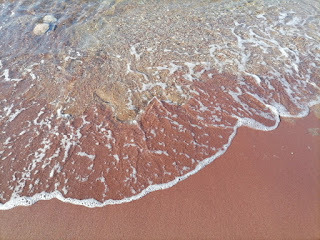
In my last blog post, I confessed I had no idea how posts would be delivered to your inbox in future after the demise of Feedburner. But the extremely helpful people at follow.it have solved the problem. You may have received this thanks to their tiny postal workers slipping it into your email inbox, but if you didn’t and you’d like to in future, you can sign up using the little box that should appear somewhere top left of the page. Apparently there are additional features, though I can’t imagine what they’re for. The helpful people even offered to give me inspiration about what I could write, or pictures I could use. Maybe they can just produce the whole blog post in future, leaving me more time to walk to a beach.
In fact, thinking about it, maybe they know how to make wine…
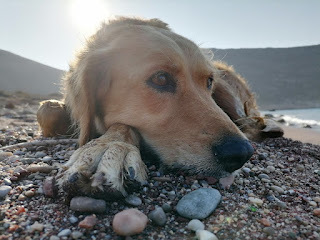
June 30, 2021
Ladies and gentlemen, may I have your attention please���?

I have a BIG apology to make.
A little while ago, I received a notification that my blog was no longer going to be delivered to subscribers via something called FeedBurner from July. As with most technological things, I tried to ignore it and hoped it would go away, until I realised that July was almost upon us and I had to do something about this. There was a list of instructions about how to download the subscriber details. I needed to click first on ���Analyze���.
But where was this word to click on? I started to search the back room of Blogger, browsing the strange terminology. Fallback subdomain. Enable custom robots (that sounds fun!).
And then purely by chance I clicked on Comments, and found more than a hundred unread comments on my blog posts. Some of them were unwanted advertising, spam, the very reason I���d activated something a few years ago that allowed me to moderate comments before they were posted. But I hadn���t also activated something to notify me of comments that needed moderating. I didn���t know they were there. So many were lovely comments from you, the readers. Some of them, especially around the time I bought my house, almost had me in tears.
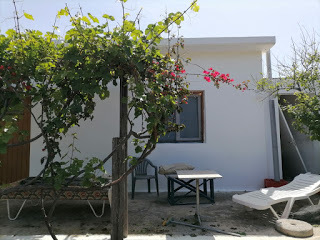

Please forgive me ��� I didn���t mean to ignore you! Some of you had written lovely things about my books, or about visiting Tilos and seeing me, or had asked for advice. And I had no idea.
To be honest, I���d stopped posting regularly because everyone had gone quiet and I thought you weren���t so interested in the blog any more. A few of you had commented that it was a shame I didn���t blog so often these days���
I still don���t know how I will deliver this blog in the future as I still haven���t figured out how to download the subscriber details. Perhaps if you would like to continue to receive it as an email, you can send me your email address in a message. Otherwise, please continue to check in from time to time, and I���ll try to keep posting.
I have, of course, been busy, as always ��� and only partly with writing and editing work. With the abrupt change to a hot, dry season, suddenly the lovely wildflowers and long grass that had filled the garden all winter and spring turned to straw and needed cutting down so as not to be a fire risk. The head gardener (my mum) then arrived from England, and as if alerted of her presence, the travelling plant-sellers started arriving by ferry with trucks full of lovely plants to sell to us.
Moreover, since the new era of freedom began, it���s been wonderful to travel again, and to have family and friends visiting. Our first trip was to Rhodes to start the process to convert my residence permit into the infamous Brexit-prompted biometric pass. So what if the SAOS ship Stavros takes five hours, going via Halki and Symi? It was a journey, on a ferry! And can you imagine a more beautiful journey, moreover taking in a coast of Symi that is so rarely seen, with its magnificent cliffs? And then once we were there, the shops and restaurants were open again...
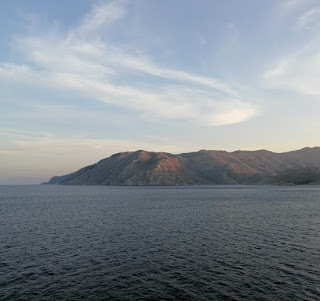
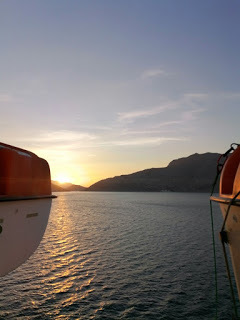

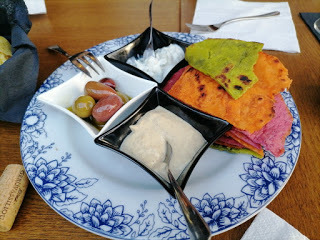

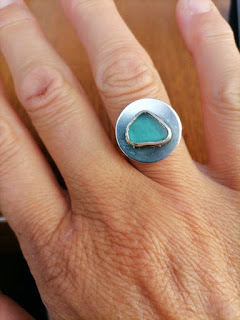
It was a year and a half ago in winter that I was last in Astypalea, failing to meet the cheese man. So last week we arranged for people to look after the garden and Fishbags the cat, and took advantage of a new route on the Dodecanese Seaways catamaran and were on the lovely westernmost island of the Dodecanese in three and a half hours. Two days later, our return via the same route looked compromised by a predicted 6 Beaufort, so we took that as a perfect excuse to stay longer. Everyone on the island seems to be a dog-lover and the animals are mostly kept away from the village, so Lisa had some wonderful off-lead freedom too.
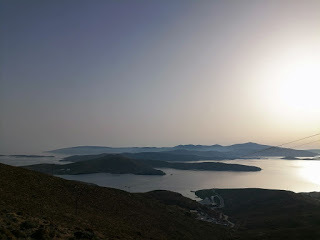




And so it was that on Sunday night and into the early hours of Monday morning, we were trying to catch a little sleep on the hard benches of the Blue Star Chios back to Tilos, with incessant announcements blaring through the loudspeakers in some form of torture, perhaps designed to make more people pay for cabins. All we���d hear was:
Ladies and gentlemen, may I have your attention please���
Followed by a minute indecipherable gobbledegook. It���s wonderful to travel, but I think we���ll stay at home for a few days.



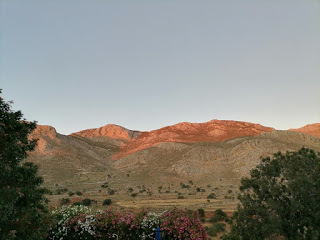
Enjoyed this post?
I've now figured out how you can subscribe!
Never miss out on future posts by following!


